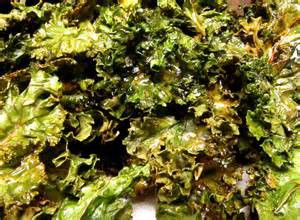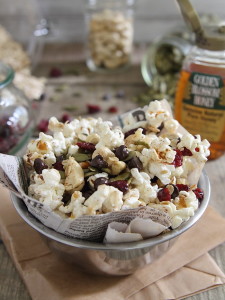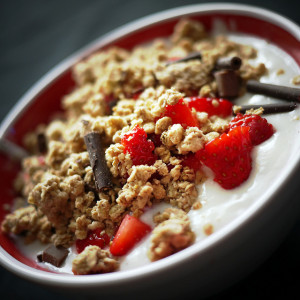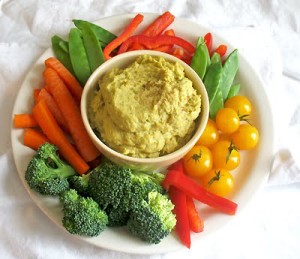 The term “snacks” has widely been associated with unhealthy foods such as chips, donuts, French fries, and other energy dense options that can be detrimental to our diets and overall health. Therefore, the health benefits of snacking are broadly overlooked, with automatic assumption that if one eats a snack between meals, it is considered unhealthy. However, choosing healthier options to eat between meals can lead to stable blood sugar levels, satiety, and energy to get us through the day. February is National Snack Food Month so it’s a great time to discuss that snacking can be healthy.
The term “snacks” has widely been associated with unhealthy foods such as chips, donuts, French fries, and other energy dense options that can be detrimental to our diets and overall health. Therefore, the health benefits of snacking are broadly overlooked, with automatic assumption that if one eats a snack between meals, it is considered unhealthy. However, choosing healthier options to eat between meals can lead to stable blood sugar levels, satiety, and energy to get us through the day. February is National Snack Food Month so it’s a great time to discuss that snacking can be healthy.
In 2015, researchers studied the contribution of snacks to dietary intake among Norwegian adults. It was concluded that snacks are in fact an important part of the diet, and that those eaten at home or at work and school were generally healthier than snacks consumed at restaurants and fast food outlets. Now, you’re probably thinking, “I don’t have time to pack my lunch, let alone snacks too!”
 However, there are plenty of quick and healthy grab and go options for work. For example, homemade trail mix is a great option to keep you satisfied between breakfast and lunch. Simply throwing a tablespoon each of three to four various nuts of your choice, a quarter cup of granola, a half-cup of popcorn, and a quarter cup of your choice of dried fruit into a bag is a great option that will provide you with good sources of protein, healthy fats, and whole grains. In fact, it was shown that a high protein snack during the day led to reduced hunger, increased fullness, and delayed subsequent eating compared to lower protein snacks in healthy women.
However, there are plenty of quick and healthy grab and go options for work. For example, homemade trail mix is a great option to keep you satisfied between breakfast and lunch. Simply throwing a tablespoon each of three to four various nuts of your choice, a quarter cup of granola, a half-cup of popcorn, and a quarter cup of your choice of dried fruit into a bag is a great option that will provide you with good sources of protein, healthy fats, and whole grains. In fact, it was shown that a high protein snack during the day led to reduced hunger, increased fullness, and delayed subsequent eating compared to lower protein snacks in healthy women.  Another choice for a high protein, healthy mid-day snack is Greek yogurt. Grab a six-ounce individual serving of low or non-fat Greek yogurt, pair it with whole fruit or berries and granola, and you’ve got yourself a balanced, nutritional snack that will keep you satisfied until dinner. Additionally, another study showed that a higher percent of snacking energy from vegetables was associated with a decrease in Body Mass Index (BMI), a universal marker of health. These snack options were compared against snacking energy from desserts and sweets, which was associated with a higher BMI and a decrease in overall diet quality.
Another choice for a high protein, healthy mid-day snack is Greek yogurt. Grab a six-ounce individual serving of low or non-fat Greek yogurt, pair it with whole fruit or berries and granola, and you’ve got yourself a balanced, nutritional snack that will keep you satisfied until dinner. Additionally, another study showed that a higher percent of snacking energy from vegetables was associated with a decrease in Body Mass Index (BMI), a universal marker of health. These snack options were compared against snacking energy from desserts and sweets, which was associated with a higher BMI and a decrease in overall diet quality.
There are lots of healthy snack ideas, including fruit paired with cheese, nuts, or nut or seed butters, air popped popcorn, roasted chickpeas, or kale chips. You can also make vegetables and protein into a healthy snack by combining celery, carrot sticks, broccoli, and/or peppers with hummus!
 Despite the backlash that snack foods have gotten in the past, take advantage of this Snack Food Month by educating yourself about the importance of healthy snacks, and become a role model for your coworkers in the office!
Despite the backlash that snack foods have gotten in the past, take advantage of this Snack Food Month by educating yourself about the importance of healthy snacks, and become a role model for your coworkers in the office!
Check out these other ideas for Smart Snacking for Adults and Teens and Healthy Snacks for Kids.
Enjoy,
Kellsey O’Donnell
Eat Fit Health Intern
Graduate Student, Drexel University
MS in Human Nutrition, 2016